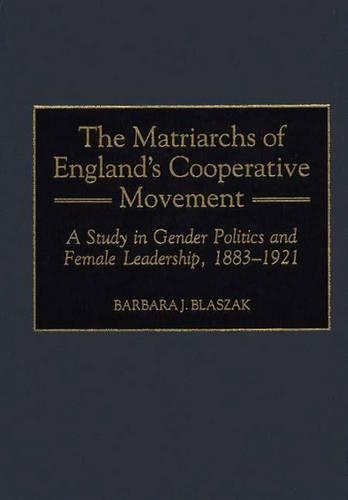
The Matriarchs of England's Cooperative Movement: A Study in Gender Politics and Female Leadership, 1883-1921
(Hardback)
Publishing Details
The Matriarchs of England's Cooperative Movement: A Study in Gender Politics and Female Leadership, 1883-1921
By (Author) Barbara J. Blaszak
Bloomsbury Publishing PLC
Praeger Publishers Inc
30th December 1999
United States
Classifications
Tertiary Education
Non Fiction
Sociology: work and labour
Pressure groups, protest movements and non-violent action
European history
Social and cultural history
305.420942
Physical Properties
Hardback
224
Width 156mm, Height 235mm
539g
Description
Current thinking considers the Women's Cooperative Guild within the English Cooperative Movement to have been an independent and democratically run organization whose leaders built sisterhood across clan lines and achieved many benefits for married working-class women. This study of the dynamics of gender within the movement between 1883 and 1921 arrives at different conclusions. Blaszak examined what freedoms of speech and activity women were permitted within the movement, as well as what resources they were given to accomplish their tasks. Ultimately, the parameters set by the men would determine the type of female leadership that emerged and whether it was able to realize its feminist and utopian agendas. Setting the organization's activities within the context of gender relations in the Cooperative Movement, Blaszak finds that the Guild was much more dependent and much less democratically directed than has usually been supposed. Restrictions established by male cooperators and enhanced by the realities of working-class life turned the Guild into a clique dominated by a few. Even the Guild's most revered leader, Margaret Llewelyn Davies, found it impossible to escape the gendered socio-economic circumstances in which she laboured at her ministry to improve the lives of working-class women. Consequently, her leadership inadvertently assisted male cooperators in their attempts to limit possibilities for women.
Reviews
"The policies and publications of the Women's Cooperative Guild have been central to women's history since its revival in the early 1970s, but very few scholars have looked in such detail at how both were actually constructed. Barbara Blaszak's new book is a fascinating and sobering study of the limits placed on this women's organization by its male-controlled parent' body, the Cooperative Union. In its analysis of the politics and leadership of Margaret Lleyellyn Davies, it also offers a cool reappraisal of a dedicated social reformer's efforts on behalf of working-class women. An extremely important contribution."-Ellen Ross Professor of History and Women's Studies Ramapo College of New Jersey
[E]ven readers with a limited interest in the WCG should find this study worth examining.-Choice
Blasak's book is a heavyweight co-operative history. It deserves to be ranked with the best....it is eminently readable and is based on remarkably in depth research.-Journal of Co-operative Studies
Blaszak recounts the story of the Women's Cooperative Guild, she does so more broadly in the context of the gendered politics of the cooperative movement as a whole. She argues convincingly that men established the boundaries in which women operated, that they feared the feminization of cooperation, and that, consequently, much of the previous work on the Guild has tended to overestimate the achievements of female cooperation....Blaszak has made an important contribution to our understanding of the gendered politics of cooperation in modern British society.-Albion
Interestingly and convincingly, she argues that male co-operators were particularly wary of female intervention in the movement.-Labor History
"Even readers with a limited interest in the WCG should find this study worth examining."-Choice
"[E]ven readers with a limited interest in the WCG should find this study worth examining."-Choice
"Blasak's book is a heavyweight co-operative history. It deserves to be ranked with the best....it is eminently readable and is based on remarkably in depth research."-Journal of Co-operative Studies
"Interestingly and convincingly, she argues that male co-operators were particularly wary of female intervention in the movement."-Labor History
"Blaszak recounts the story of the Women's Cooperative Guild, she does so more broadly in the context of the gendered politics of the cooperative movement as a whole. She argues convincingly that men established the boundaries in which women operated, that they feared the feminization of cooperation, and that, consequently, much of the previous work on the Guild has tended to overestimate the achievements of female cooperation....Blaszak has made an important contribution to our understanding of the gendered politics of cooperation in modern British society."-Albion
Author Bio
BARBARA J. BLASZAK is an Associate Professor and the Chair of the Department of History at Le Moyne College in Syracuse, New York. She has published works about the Cooperative Movement in England and on women's roles in that movement. She is a past president of the New York State Association of European Historians and is active in the Middle Atlantic Conference on British Studies.
